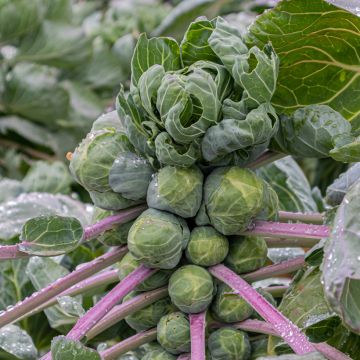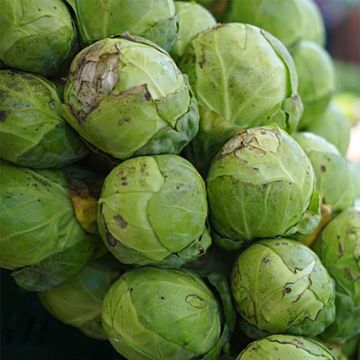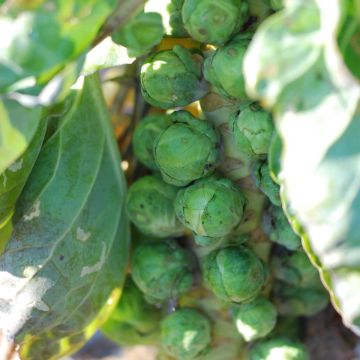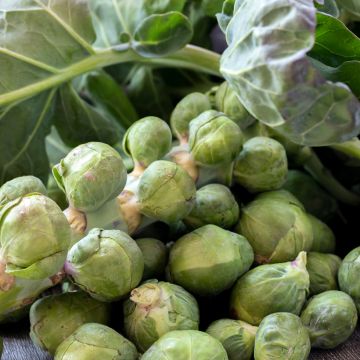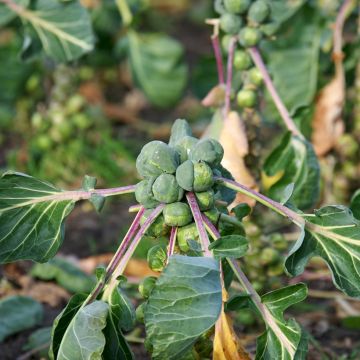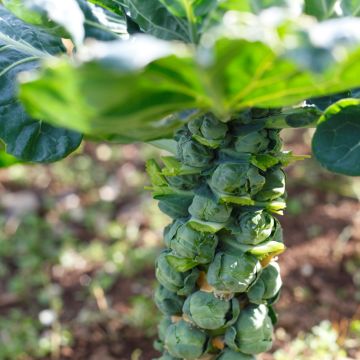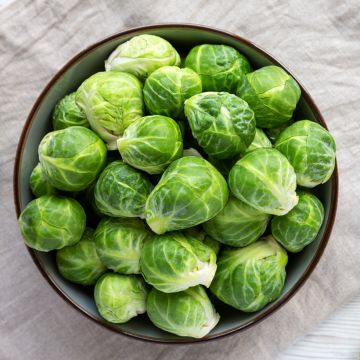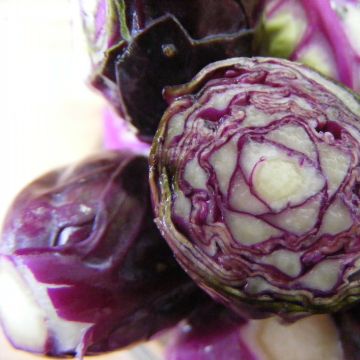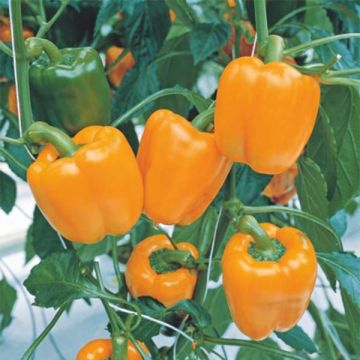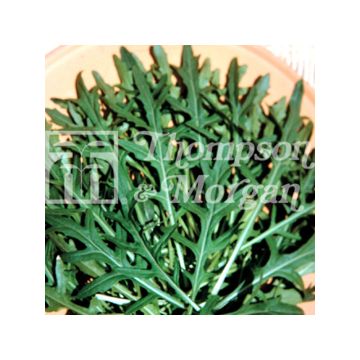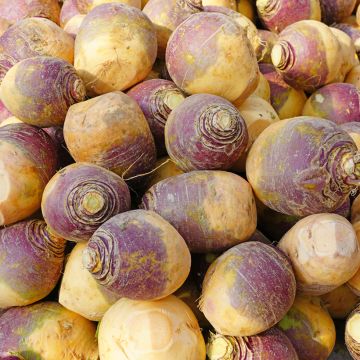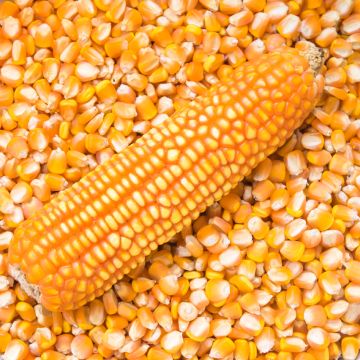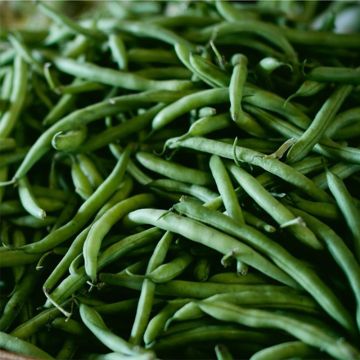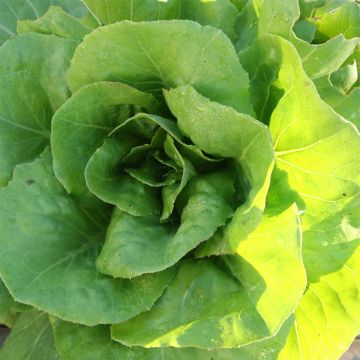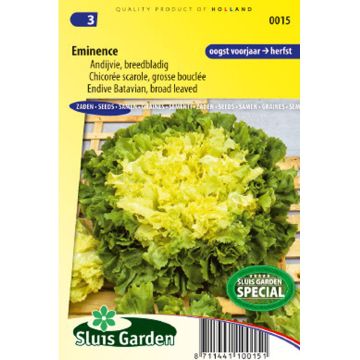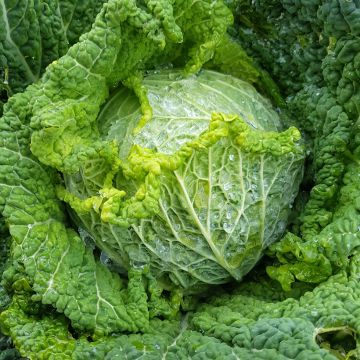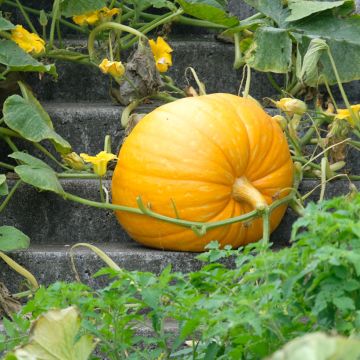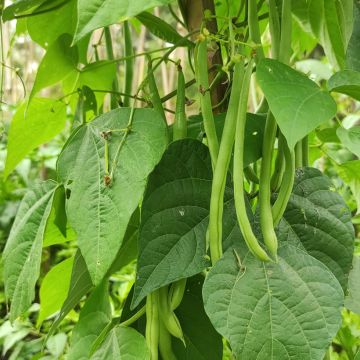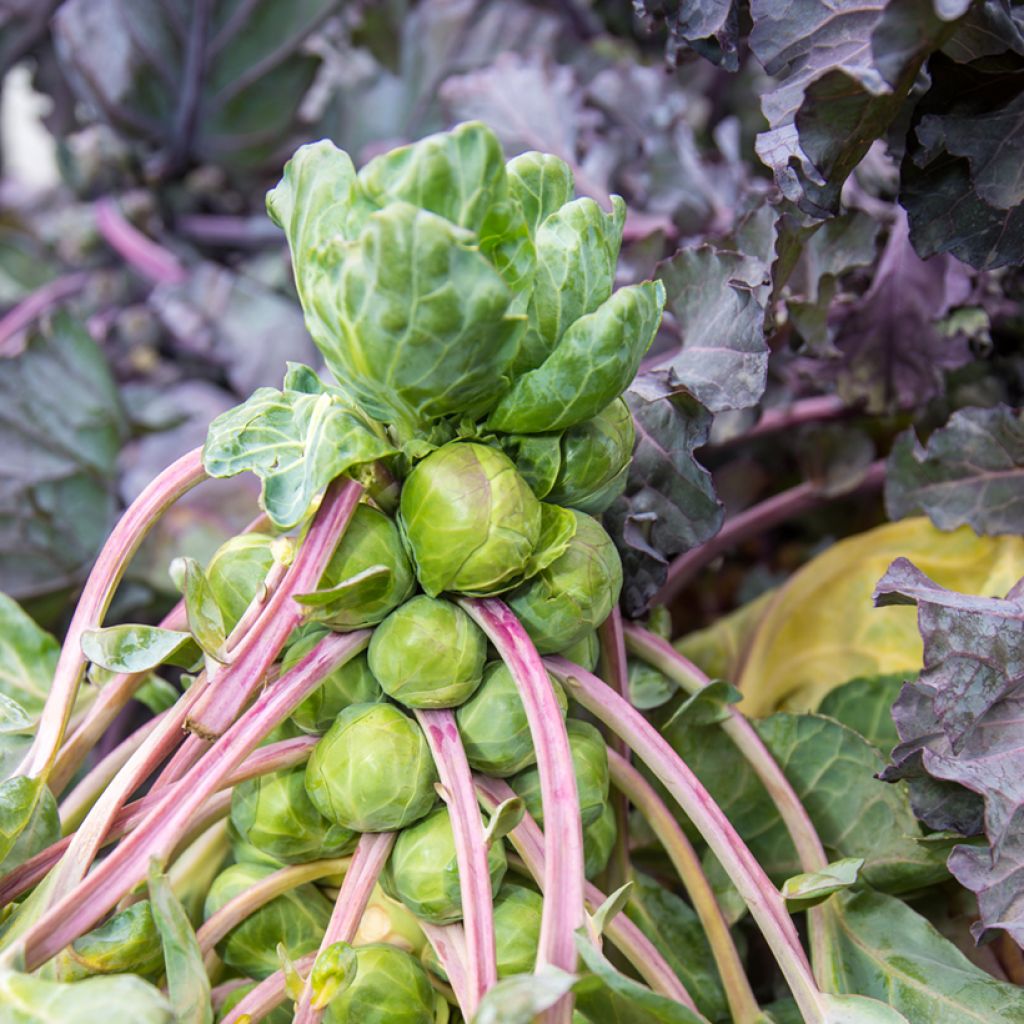

Brussels Sprout Bosworth F1 - Brassica oleracea gemmifera
Brussels Sprout Bosworth F1 - Brassica oleracea gemmifera
Brassica oleracea gemmifera Bosworth F1
Brussels Sprout
Good morning. Stay tuned.
Claudette T., 29/06/2017
Why not try an alternative variety in stock?
View all →This plant carries a 6 months recovery warranty
More information
We guarantee the quality of our plants for a full growing cycle, and will replace at our expense any plant that fails to recover under normal climatic and planting conditions.
Seed-only orders are dispatched by sealed envelope. The delivery charge for seed-only orders is €3.90.
Delivery to Corse prohibited: UE law prohibits the import of this plant from mainland France to Corse as part of the fight against Xylella fastidiosa. Please accept our sincere apologies.
More information
Description
The 'Bosworth F1' Brussels Sprout is an award-winning English variety recognised by the prestigious Royal Horticultural Society, which produces smooth, firm, and delicious Brussels sprouts. It is a vigorous Brussels sprout that withstands wind and resists mildew. Sow from March to April for harvest from October to December.
The Brussels sprout is a vegetable whose axillary buds, which form small heads called "buttons," are consumed. This biennial vegetable, grown as an annual, belongs to the large family of Brassicaceae (formerly Cruciferae). It bears the Latin name Brassica oleracea gemmifera. Latin enthusiasts will appreciate "Gemmifera," which refers to precious stones.
Originating from Belgium, this cabbage is a hybrid developed in the 14th century by market gardeners from Saint-Gilles (a municipality on the outskirts of Brussels), who were concerned with increasing their productivity. Indeed, growing vertically, Brussels sprouts take up little space on the ground and allow for abundant harvests in a minimum of space.
An autumn and winter vegetable par excellence, Brussels sprouts have a mild, sweet, and comforting flavour. Cooked with care, their delicate taste pairs well with bacon, smoked bacon, and chestnuts. They can be eaten cooked, sautéed, braised, or even gratinéed... Quickly steamed, they are also excellent cold in salads. They are vegetables rich in fibre, antioxidants, and vitamins C and B.
Brussels sprouts are less demanding than most cabbages, thriving in sunny and moderately rich soil, especially in nitrogen. A too generously fertilised soil would produce small, open, or burst heads.
NB: This variety is labelled F1 for "F1 hybrid" because it is a variety resulting from the crossbreeding of carefully selected parents to combine their qualities. This results in a variety that can be flavourful and early while also resistant to certain diseases. Sometimes criticised or wrongly associated with GMOs, F1 hybrid seeds are attractive for their uniformity and resistance. Still, unfortunately, their qualities do not pass on to subsequent generations: it will, therefore, not be possible to save the seeds for later sowing.
Harvest: Brussels sprouts are harvested by starting from the bottom of the stem and cutting the small heads with a knife.
Storage: Brussels sprouts can be stored for 3 to 4 days in the refrigerator's vegetable drawer. They can also be frozen well after being blanched in salted boiling water for 3 to 5 minutes.
Gardener's tip: The main enemy of cabbage is the cabbage white butterfly (Pieris brassicae), a beautiful creamy white butterfly with small black spots that emerge in April-May to feast on its leaves throughout the summer. Don't be caught off guard; opt for prevention by installing an insect-proof net tightly on market garden hoops. These nets are easy to set up and reusable to protect, for example, your carrot and leek crops.
Report an error about the product description
Harvest
Plant habit
Foliage
Botanical data
Brassica
oleracea
gemmifera Bosworth F1
Brassicaceae
Brussels Sprout
Cultivar or hybrid
Annual
Other Brussels sprout seeds
Planting and care
Sowing:
The Brussels Sprout 'Bosworth F1's germination temperature is between 7 and 20°C and takes about 14 days.
It is sown from March to April for a harvest from October to December.
You can sow directly in place or prepare seedlings that will later be planted in their final position in the garden.
Preparing seedlings: In a heated greenhouse at the end of winter or in a cold greenhouse in the garden for the rest of the year, sow the seeds at a depth of 1 cm (0in) in a good seed compost. Cover lightly with compost or vermiculite. Don't forget to keep the substrate moist but not waterlogged!
When the young plants appear strong enough to handle, transplant them into pots if necessary and, for seedlings in a heated greenhouse, gradually acclimatise them to cooler temperatures before transplanting them to the garden when there is no longer any risk of frost.
Direct sowing: In suitably amended and finely worked soil, make furrows about 1 cm (0in) deep, spaced 65 cm (26in) apart. Sow the seeds and cover them with a thin layer of fine soil. When the seedlings are well developed, thin them out, leaving only one plant every 65 cm (26in).
Cultivation:
The Brussels Sprout is a vegetable that is less demanding than most cabbages. It thrives in moderately rich soil, especially in nitrogen. Soil that is too heavily manured would produce small, open, or burst sprouts.
It is not very tolerant of soil pH, which should be between 5.6 and 6.5. In acidic soil, it will be necessary to gradually increase the pH by adding calcium in the form of Dolomite or Lime.
Like all cabbages, Brussels Sprouts are susceptible to diseases such as Clubroot and pests (Cabbage White Butterfly, Cabbage Fly, Flea Beetle, Gall Midge...). This crop needs to pay attention to crop rotations.
Seedlings
Care
Intended location
-
, onOrder confirmed
Reply from on Promesse de fleurs
Vegetable seeds
Haven't found what you were looking for?
Hardiness is the lowest winter temperature a plant can endure without suffering serious damage or even dying. However, hardiness is affected by location (a sheltered area, such as a patio), protection (winter cover) and soil type (hardiness is improved by well-drained soil).

Photo Sharing Terms & Conditions
In order to encourage gardeners to interact and share their experiences, Promesse de fleurs offers various media enabling content to be uploaded onto its Site - in particular via the ‘Photo sharing’ module.
The User agrees to refrain from:
- Posting any content that is illegal, prejudicial, insulting, racist, inciteful to hatred, revisionist, contrary to public decency, that infringes on privacy or on the privacy rights of third parties, in particular the publicity rights of persons and goods, intellectual property rights, or the right to privacy.
- Submitting content on behalf of a third party;
- Impersonate the identity of a third party and/or publish any personal information about a third party;
In general, the User undertakes to refrain from any unethical behaviour.
All Content (in particular text, comments, files, images, photos, videos, creative works, etc.), which may be subject to property or intellectual property rights, image or other private rights, shall remain the property of the User, subject to the limited rights granted by the terms of the licence granted by Promesse de fleurs as stated below. Users are at liberty to publish or not to publish such Content on the Site, notably via the ‘Photo Sharing’ facility, and accept that this Content shall be made public and freely accessible, notably on the Internet.
Users further acknowledge, undertake to have ,and guarantee that they hold all necessary rights and permissions to publish such material on the Site, in particular with regard to the legislation in force pertaining to any privacy, property, intellectual property, image, or contractual rights, or rights of any other nature. By publishing such Content on the Site, Users acknowledge accepting full liability as publishers of the Content within the meaning of the law, and grant Promesse de fleurs, free of charge, an inclusive, worldwide licence for the said Content for the entire duration of its publication, including all reproduction, representation, up/downloading, displaying, performing, transmission, and storage rights.
Users also grant permission for their name to be linked to the Content and accept that this link may not always be made available.
By engaging in posting material, Users consent to their Content becoming automatically accessible on the Internet, in particular on other sites and/or blogs and/or web pages of the Promesse de fleurs site, including in particular social pages and the Promesse de fleurs catalogue.
Users may secure the removal of entrusted content free of charge by issuing a simple request via our contact form.
The flowering period indicated on our website applies to countries and regions located in USDA zone 8 (France, the United Kingdom, Ireland, the Netherlands, etc.)
It will vary according to where you live:
- In zones 9 to 10 (Italy, Spain, Greece, etc.), flowering will occur about 2 to 4 weeks earlier.
- In zones 6 to 7 (Germany, Poland, Slovenia, and lower mountainous regions), flowering will be delayed by 2 to 3 weeks.
- In zone 5 (Central Europe, Scandinavia), blooming will be delayed by 3 to 5 weeks.
In temperate climates, pruning of spring-flowering shrubs (forsythia, spireas, etc.) should be done just after flowering.
Pruning of summer-flowering shrubs (Indian Lilac, Perovskia, etc.) can be done in winter or spring.
In cold regions as well as with frost-sensitive plants, avoid pruning too early when severe frosts may still occur.
The planting period indicated on our website applies to countries and regions located in USDA zone 8 (France, United Kingdom, Ireland, Netherlands).
It will vary according to where you live:
- In Mediterranean zones (Marseille, Madrid, Milan, etc.), autumn and winter are the best planting periods.
- In continental zones (Strasbourg, Munich, Vienna, etc.), delay planting by 2 to 3 weeks in spring and bring it forward by 2 to 4 weeks in autumn.
- In mountainous regions (the Alps, Pyrenees, Carpathians, etc.), it is best to plant in late spring (May-June) or late summer (August-September).
The harvesting period indicated on our website applies to countries and regions in USDA zone 8 (France, England, Ireland, the Netherlands).
In colder areas (Scandinavia, Poland, Austria...) fruit and vegetable harvests are likely to be delayed by 3-4 weeks.
In warmer areas (Italy, Spain, Greece, etc.), harvesting will probably take place earlier, depending on weather conditions.
The sowing periods indicated on our website apply to countries and regions within USDA Zone 8 (France, UK, Ireland, Netherlands).
In colder areas (Scandinavia, Poland, Austria...), delay any outdoor sowing by 3-4 weeks, or sow under glass.
In warmer climes (Italy, Spain, Greece, etc.), bring outdoor sowing forward by a few weeks.

































